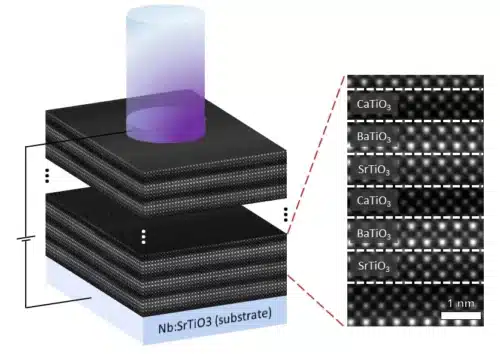The ferroelectric material is changing solar panels, making them more efficient and cheaper, impacting renewable energy and climate change.

Current solar cells mainly use silicon with limited efficiency, leading researchers to explore new materials like ferroelectric barium titanate. These materials generate electricity from light without a PN junction, simplifying solar panel production. However, pure barium titanate has low sunlight absorption, resulting in limited photocurrent.
Scientists at Martin Luther University Halle-Wittenberg (MLU) have developed a novel technique to enhance solar cell efficiency by 1,000. This advancement was accomplished by fabricating crystalline layers of barium titanate, strontium titanate, and calcium titanate sequentially stacked in a lattice formation.
During photoelectric measurements, the new material was exposed to laser light, yielding results that astonished the research group. Compared to pure barium titanate of similar thickness, the current flow increased by up to 1,000 times, even though the proportion of barium titanate, the primary photoelectric component, was reduced by nearly two-thirds.
This development holds significant potential for the solar industry. Solar panels constructed with this new material would be substantially more efficient and cheaper to produce compared to silicon-based solar cells. Additionally, they would need less space to create the same amount of electricity, making them especially suitable for urban areas where space is at a premium.
The discovery by the research team could play a pivotal role in this transition. By amplifying the photovoltaic effect in ferroelectric crystals, the new material has the potential to boost solar panel efficiency significantly. This advancement would make solar energy more economical, decrease our dependence on fossil fuels, and aid in the fight against climate change.
The team is optimising the new material and developing a prototype solar cell. Success in this endeavour could lead to commercial solar panels based on the material in the next few years. The team’s findings have also caught the interest of investors and entrepreneurs, with several start-ups exploring commercialization and venture capitalists eager to fund further research.






